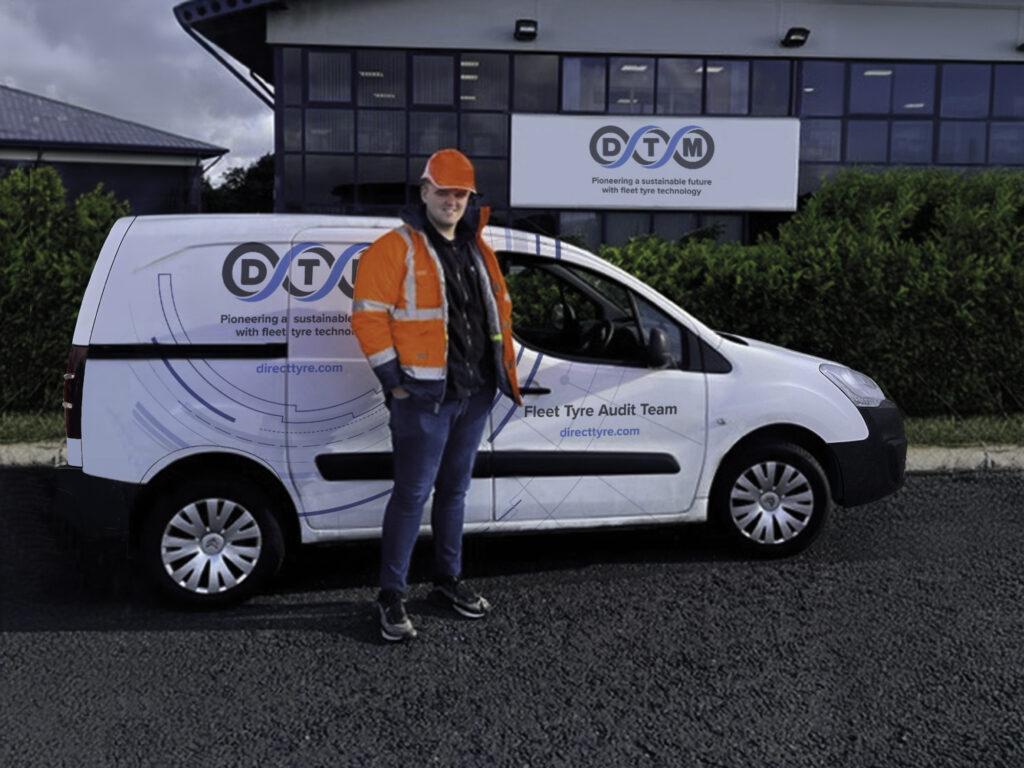As the transport and logistics industries look for ways to meet net-zero targets, tyre management expert DTM has increased its data and reporting capabilities to support fleet customers in meeting the challenge. CEO Leigh Goodland explains how this technology investment is positively affecting service delivery and reducing fleet customer carbon emissions.
I’m the eternal optimist and I’m perfectly happy to acknowledge that, but as DTM celebrates its 20th year in business, I genuinely believe our best years are yet to come. We have 20 years of tyre management experience, are knowledgeable industry experts, and have worked hard to ensure we provide high standards of customer service. But the industry has changed, and our customers are under pressure to meet net-zero targets. To support this, we needed to take a long hard look at our business and do things differently – it’s the best thing we’ve ever done.
The tyre industry, by its nature, is one of the most challenging to transform to become more environmentally considerate, but by scrutinising each element of our business process and looking for better ways to do things, we are making significant progress.
One of the biggest advances for DTM over the past year has been our investment in technology. In 2023 we appointed a highly experienced Chief Technology Officer, Matt Lee, and a team of in-house developers. Under Matt’s leadership, the team has developed a bespoke customer portal, which enables customers to log their tyre service jobs directly onto our system and have an appointment scheduled, which they can track online.
For our customers, this is providing a quick and easy way to book tyre maintenance jobs and have full visibility of their progress. By collaborating closely with early adopters of the new system, we have been able to continually enhance its capabilities to tailor to specific customer requirements and make the functionality intuitive and efficient.
The online system is already enabling us to access invaluable tyre usage insight, both at individual customer fleet level, and across our entire portfolio. This in turn will enable us to run analysis that will allow customers to identify where they are experiencing unnecessarily high levels of tyre usage on vehicles in their fleets as a result of factors that could be changed, such as driver behaviour, tyre suitability, or uneven loading of cargo.
We have also introduced a fleet of mobile tyre auditors. They are responsible for visiting customers up and down the UK and physically reviewing the tyres on each HGV and van in the fleet, making observations and recommendations. Combined with our ability to analyse data on tyre usage, this is resulting in a significant reduction in the number of tyres our customers are using year on year. This is good for the environment and fleet operations.
Launching our new customer portal has been invaluable, both in terms of providing a single data source for all of our customer operations and for driving the efficiency of our customer service provision. Our Blackpool-based customer experience centre agents are freed up to handle the most urgent customer calls, where drivers require immediate roadside assistance.
Generally, our urgent calls are associated with incidents with HGVs or specialist vehicles, where we need to quickly get the vehicles back into operation in line with customer KPIs and avoid disruption to the road network. Recently, however, we received a more unusual callout from a new fleet customer who found himself in need of our help on his wedding day. When the best man informed our customer (the groom) that his electric car had a puncture, he thought it was a jolly wedding day prank, but he soon realised that his car tyre was flat on his drive, and he needed to get it sorted out and get to the wedding on time. Our customer experience team were able to quickly get the tyre attended to and our customer’s day continued to plan. Our team was delighted to be able to help.
The introduction of highly experienced and knowledgeable mobile fleet tyre auditors, aligned with tyre usage insight, is reducing the number of tyres used across our portfolio each year. We also provide our customers with driver training via our Tool Box Talks video, which shows drivers what to look out for and ensures that they are equipped to take preventative action as soon as they identify a problem and before it creates an expensive and potentially hazardous tyre blowout.
In reviewing operational processes, we identified that more efficient, proactive tyre maintenance can avoid nearly new tyres being wasted when the damaged area could be repaired and the tyre life prolonged, which would reduce operating costs and lessen the environmental impact. This proactive maintenance now plays an important role in our tyre management process and works extremely well for our customers.
When a tyre does reach the end of its useful life, we partner with industry specialists to streamline the casing collections process, maximise tyre recycling, and minimise environmental impact.
Initially, these changes were significant steps, but all the hard work was absolutely worth it. Our ESG (Environmental Social Governance) commitments and environmental strategy are the sense check behind all of our decision making, as well as giving a real sense of pride to our team.
As we celebrate our 20th year in business, we will continue to provide best practice services to our customers, and through data analysis and insight, we can reduce our industry’s impact on the environment.






